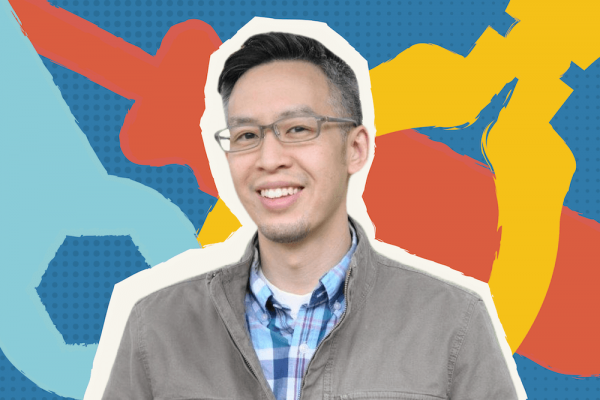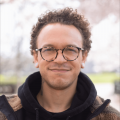This interview is part of The Reconstruct, a weekly newsletter from Sojourners. In a world where so much needs to change, Mitchell Atencio and Josiah R. Daniels interview people who have faith in a new future and are working toward repair. Subscribe here.
I originally met educator and grassroots theologian David Leong in 2016 after I emailed him on a whim, telling him I was coming to visit friends in Seattle and that I’d like to meet him for coffee. I had just read an advanced copy of his book Race and Place, about churches in urban contexts, and was impressed by the conversational tone it took when addressing issues like race, class, and gentrification.
We met at a coffee spot in the Seattle neighborhood of Beacon Hill. I was still attending seminary in my home state of Illinois, and I had never been to Seattle before. Leong, a theology professor at Seattle Pacific University, has intimate knowledge of the history of Seattle, which he was eager to share with me. Over the span of 2 hours, we conversed about everything from the Black Panther Party in Seattle to how churches in the city can be more involved in fighting gentrification. We eventually parted ways and lamented the fact that we lived on opposite sides of the country.
Then, in 2018, the search for work pushed me out to Seattle and I decided to move to the one neighborhood I was familiar with: Beacon Hill. Leong and I were now close enough where we could meet regularly and talk about the theological impact of Willie James Jennings’ book The Christian Imagination, systemic racism and city planning, SPU’s position on human sexuality, and our hopes for and frustrations with the institutional church.
Leong and I have continued the conversation over the years, and we were excited to invite others into our conversation, which took place in October 2023. Below, we talk about what it means to be a good neighbor, theological education, why “progressive” politics doesn’t necessarily translate to being a good neighbor, and what we imagine to be the future of Christianity.
This interview has been edited for length and clarity.
Josiah R. Daniels, Sojourners: What does it mean to be a good neighbor, especially in an urban context?
David Leong: That’s the million-dollar question. The question of what it means to be a good neighbor is not one we spend enough time pondering.
We’re really good with the abstract neighbor category, like when we’re watching what’s happening in Israel and Palestine, and we’re like, “Oh my god, the violence, the destruction, especially to children, to innocent life — these are my neighbors.” But that’s easy to say at arm’s length. I’m not trying to diminish the importance of advocating for peaceful resolutions there, at the same time, when we bring the question of neighbor love closer in, [we see that] love is not a fluffy, abstract ideology.
[To borrow] from Latin American critical pedagogy and from the basic life experience of being a neighbor, love is praxis. It’s action-oriented. It’s tangible. And, therefore, it’s proximate. And so love of neighbor requires some sort of proximity.
Most gathered congregations I know don’t have the sort of relational proximity to their neighbors that they should. And it’s not easy work. If we require relational, geographic proximity, and if we want to believe that the neighbors we’re accountable to are vulnerable people, of which there is never a shortage in cities, then there are all sorts of reasons for congregations not to be in proximate relationship with those people. Partially because of the way cities are designed, but also because — a lot of churches don’t want to admit this — they don’t actually care about their neighbors. They care much more about themselves.
And again, this is where that proximity piece is key. The under-housed, the addicted, the incarcerated, those people, frankly, don’t touch our lives in any meaningful way. And so for me to try to drum up some enthusiasm to care about them more tangibly, well, there’s a million reasons for me not to do that. Because it’s so much easier to just kind of remain where I am with all the barriers and say, “Let’s write some checks. Let’s click on some likes for some online campaigns.” And so love of neighbor becomes difficult.
What sort of narratives do you hear from people trying to convince themselves that having “good” or “progressive” opinions translates to being a good neighbor?
Seattle is such a funny place. I’ve been here 20-something years. It’s an amazing city: natural beauty, such unique cultural history, a world-class city, great educational institutions, and great businesses. I love it here.
I wouldn’t say I’ve fallen out of love with Seattle, but I certainly am trying to make sense of this place because the challenges we’ve faced over the past few years have really kind of pressed into some of [the city’s] paradoxes.
At the very base of it, the biggest disappointment I see here is the kind of wealth concentration that’s frankly offensive. If you want to tackle some of these deep challenges, everything from homelessness to climate change to achievement gaps — that are racial and wealth based — in public schools, what we need are financial resources, researchers and organizers, political will, and social capital. Seattle has all those things.
But I think urbanists and churches and neighbors and citizens are all kind of struggling under the weight of picking any one of these things [to address].
But you look at Seattle, and you have all the tools at your disposal. I wouldn’t say it’s refusal, there are reasons why we can’t mobilize those resources to tackle our challenges, but I think that’s the funny thing about “progressive people” — the people who are overeducated but who have no real carrot or stick to put them in relationship or proximity with anyone who’s actually in need. That to me is the ultimate offense. This is a place where every other neighbor I meet has a graduate degree in environmental science or a Ph.D. in Indigenous studies, etc. There are a lot of great people here, but I think this sort of baseline default is to consume the right media and say the right things.
This is one hopeful place where the church could be. It’s a place where, at the end of the day, the story that Christians tell is that we are very broken people. And it doesn’t matter if you’re a tech executive or a single mom or an addict. We come to the table as broken individuals. The only hope we have is each other. We have to form a community that allows people to say, “Hey, I’ve got addiction in my life,” and for a wealthy person to be like, “I’m addicted to security. I’m addicted to selfishness and entitlement.”
Let’s think about our mutual brokenness. Let’s form a friendship and think about how similar our lives actually are. If people just got a little bit more proximate to the unhoused, they’d be like, “Wow, that’s your life. You actually have a part-time job. You had a medical emergency and lost your insurance. That could have been me.” But I think the fact that everybody wants to end homelessness, but nobody’s willing to have any skin in the game is something the church could talk about.
Let’s be more transparent and vulnerable with each other. Let’s have real conversations that I think people are hungry for.
As a professor, what has it been like on Seattle Pacific University’s campus the past few years as students have been organizing for LGBTQ+ inclusion?
It would be hard to capture all the different dynamics of both the conflict and turmoil, of hopefulness and disappointment, of organizing and chaos.
In some ways, it’s hard for me to even separate the last few years from what feels like a longer season of discontent on the campus from the 2016 election forward. It’s not really so much about national or presidential politics, although that plays a part, I think it just coincides. We’re probably not the only university that was going through this. The election stuff was a catalyst, but there was a lot of concern from that period into probably 2020-ish.
More or less, I would say it was students and community stakeholders wanting to hold university leadership to account for its rhetoric, for its marketing [as it relates to diversity on campus]. What might help to frame this a little is to say that within the CCCU, Seattle Pacific has always been on the margins.
This is maybe a little bit in the weeds, but the presidential leadership [under Daniel J. Martin in 2012-2021] was trying to move SPU away from the CCCU. Not so much as a cultural or political statement, but more so because it was more reflective of what the university already was socially.
[Martin] left the university leading up to the present conflict because he kind of saw the writing on the wall. I don’t love the term “progressive” because it’s just sort of an imprecise blanket term, but I think he basically [thought] the university could become a sort of progressive, Christian university — still confessional, still anchored to its history, but just more reflective of the region. To put it more simply, just from a simple marketing and business standpoint, the CCCU brand is just not viable here. It’s just not.
After Martin left, a vacuum was filled by a rogue vocal minority that leveraged an unfortunate set of bylaws in their favor and just pushed all dissenting voices out.
It’s no secret that faculty voted “no confidence” in the board of trustees and that multiple years of external consultants tried to reconcile these rifts. I mean, there’s just an enormous lack of trust and just a failure of communication within executive leadership itself.
That’s about as negative of a description as probably somebody could give. But in the midst of it, there was a remarkable amount of resiliency among students.
I’m always impressed by students. Students inherited a pretty terrible situation, which they didn’t ask for, and they really made the best of it. They didn’t throw up their hands. The organizing work, tragically, had less effect than they’d hoped for. But it was really admirable and impressive for undergrads who felt like they didn’t have many options.
I think the future of Christianity can only be reached after we do a thorough critique of it. What do you think?
I’m back again to that question of can any community exist with real socioeconomic diversity? Can it hold those things together? And every church wants to do that. We’re all so embedded in racial capitalism that we’re not able to really see [it].
But I do think the questions at the root of, “How can we be a community where there’s such stark gaps of wealth and privilege?” reframes everything. And this is where I think the Christian tradition, I would hope, has some resources to offer us.
It’s a very provocative line of questioning that [asks]: Are we or are we not complicit in the logic of real estate that has an inherently detrimental effect on our neighbors? And we kind of want to have it both ways, honestly. Like we want to have the financial stability that allows us to do the things that we think should be done a certain way.
And we also want to be compassionate toward people, but I think we’re currently facing the reality that we just can’t have it both ways.
I am also in bed with the empire here. And I just don’t know what to do. But I do know I’m broken enough to need some other people to help me to think about it.
Got something to say about what you're reading? We value your feedback!







